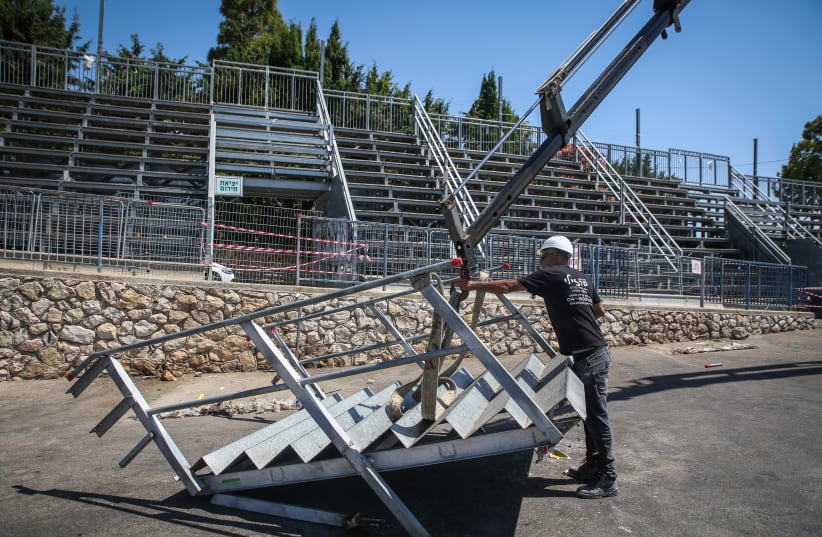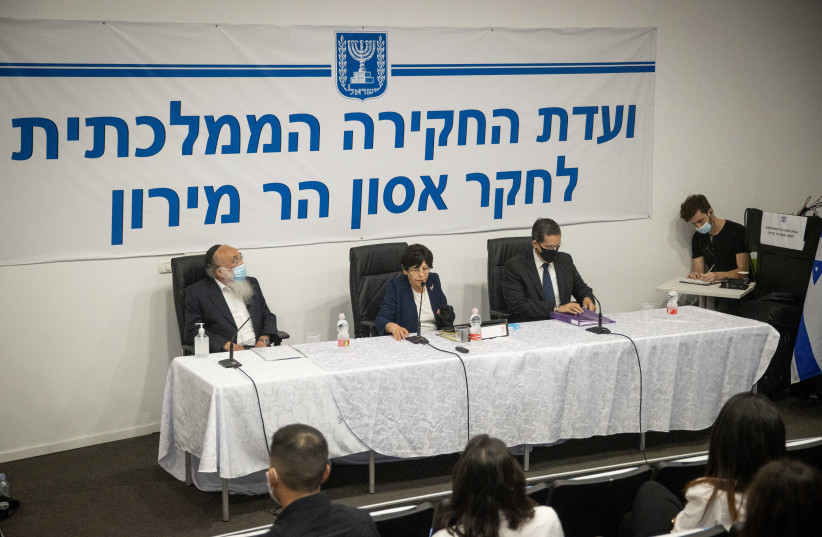Shmuel Rabinowitz, rabbi of the Western Wall and the Holy Sites, pointed the finger at a variety of parties for the Mount Meron disaster to avoid any personal blame, while testifying on Monday before the State Commission of Inquiry.
Rabinowitz, himself a haredi rabbi, repeatedly accused extremist haredim of various sects of destabilizing and endangering visitors to the site, as well as the police and the Justice Ministry for insufficiently creating order.
The senior rabbi, who engaged in a mix of spiritual comments, light humor and solemnity regarding the tragedy, did get push-back from the commission members, who include Commission Chair and former Supreme Court president Miriam Naor, Rabbi Mordechai Karelitz, and IDF Maj.-Gen. (res.) Shlomo Yanai.
Yanai in particular took Rabinowitz to task, saying that he could not avoid blame after having served in an oversight role of Mount Meron for 13 years, even if the root causes of the disaster might stem from other officials.
Given the passage of 13 years, the former IDF major-general said, Rabinowitz needed to have either taken action to get the site and the events at Meron to a point where they were safe, or to resign and make way for someone new who might do better.
Rabinowitz responded saying that between the time he became the leader of a committee of five religious officials responsible for certain religious aspects and religious building infrastructure in 2008 and 2011, he succeeded at making major changes.
He said that no matter how poor the infrastructure, layout and safety issues were now, the current setup was “gold” compared with how horrid it had been before 2008.
Rabinowitz also testified that extremist haredi sects had harassed him, even protesting outside his house and requiring him to obtain bodyguards anytime he tried to improve or change the status quo at Meron.
According to the rabbi, these extremists were against any kind of change, believing that changes could upset other uncharted burial grounds and otherwise disturb the site’s mystical status.
He said that because of the extremists who opposed his involvement, he rarely visited the site, and even when he did, he did so quickly and under heavy guard to avoid friction.
Moreover, if anyone had ever told him he and his committee would become responsible for running the Lag Ba’omer event, he said that he would have immediately resigned.
Commission members said that while Rabinowitz could disclaim responsibility for the specific event, he could not avoid responsibility for the dilapidated condition of certain bridges and infrastructure connected to religious buildings.
Rabinowitz answered that he has no expertise in such issues, and that the engineers his committee hired had assured him there were no problems. He also accused the police of not having control of visitors, and said that even the police headquarters on the site itself was built in an unsafe or illegal manner.
Rabinowitz said that by the time the disaster occurred he had already visited and left the site some time before, and noted that he took the disaster personally, with his nephew being caught up in the tragedy.
Alon Asur, who served as Northern District police commander from 2016-2019, testified next about why he had not ordered a limit in the number of visitors who could come to Meron during Lag Ba’omer.
Asur said two issues led him to conclude that there was no point in trying to make such a push.
First, he said that the legal establishment had not defined to what extent the police could restrain freedom of movement and freedom of religion in favor of public safety surrounding the site.
Second, he said that setting any number would have been theoretical as the layout of the site would have made it physically impossible to prevent highly committed visitors from arriving from around the country.
This would have been the case unless there was wall-to-wall political support and momentum for completely transforming the site, something which he said did not exist, certainly not until this past spring’s disaster.
Asur said a local official had told him that the police had tried to limit the number of attendees around 2008, and that their efforts had failed miserably.
Pressed on whether there could be interim solutions to limit or slow the advance of attendees, he explained that there were some techniques, such as having traffic officials stop buses as they converged on the area, but even this was at most a temporary reprieve he said.
The disaster occurred on April 30, when 45 men and boys, mostly haredi, died in a mass crush on the site of the tomb of Talmudic sage Shimon Bar Yochai, where tens of thousands of pilgrims had gathered for the annual Lag Ba’omer celebration in what was Israel’s worst civilian disaster.
The investigating committee was formed in late June after the new government of Prime Minister Naftali Bennett was formed, and overturned former prime minister Benjamin Netanyahu’s decision to avoid a formal inquiry.
Netanyahu, former public security minister Amir Ohana and other haredi political officials, along with Rabinowitz, had wanted to avoid finger-pointing over the tragedy.

